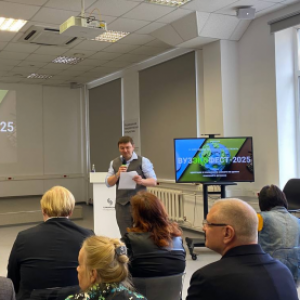On April 14, Samara National Research University became for the fourth time a participant in the 11th Annual Interuniversity Youth Festival "VuzEcoFest" to be held with the information support of the Ministry of Science and Higher Education of Russia. In 2025, its key theme was adapting to climate changes at the company and regional levels.
The University began the first day of its participation in the Festival with the panel discussion that brought together over 60 participants. They included representatives of regional authorities, scientists from Samara University, representatives of companies and public organizations, as well as students of the Institute of Economics and Management, specializing in Public Administration.
The panel discussion was opened by Victoria Bolgova, Vice Rector of Samara University. She recalled that the principles of sustainable development, nature-like technologies, and the issues of the ecology impact on business are all directly related to the University’s scientific and social interests.
"Specialists who work in this field are at the forefront of technological and social challenges and will always be in demand by society. I sincerely hope that the discussion results will not only be useful to specialists and the business community, but also become a source of inspiration for your future scientific research and practical activities", said Victoria Bolgova addressing the students.
Natalia Rogova, Minister of Youth Policy of the Samara Region, welcomed the event participants.
"The 11th Youth Festival in the field of sustainable development "VuzEcoFest" is an important event that unites people who strive for preserving our planet and improving the environmental situation", stressed the minister.
The panel discussion was moderated by Vladimir Platonov, Head of the Department of Ecology and Life Safety. The key challenges related to climate changes and the role of the Samara Region in developing adaptation measures were discussed.
Andrey Ardakov, Head of the Environmental Policy Department of the Samara Region’s Ministry of Natural Resources and Ecology, informed that, according to the ministry’s assessment, 13 climate risks of various extent of influence have been identified in the region, including 2 types of risks classified as very dangerous. According to the pessimistic scenario, the damage to the regional economy from climate changes could reach 38 billion rubles per year.
Maksim Chernyshev, Sberbank’s Staff Manager in the area "Sustainable Development", dedicated his speech to Russia’s goals of achieving carbon neutrality and plans for adapting to climate changes. He also focused on the issues of reducing greenhouse gas emissions, and spoke about forming the market for quotas for these gases in Russia.
Maksim Chernyshev asked the students the question: what, in their opinion, is the cause of climate changes — human activity or natural factors? Here the student audience’s views divided, but the participants in the discussion agreed that the civilization’s impact on the environment should be reduced in any case.
The worthy continuation of the report by the representative of the Ministry of Natural Resources of the Samara Region was the presentation by Pavel Roshchin, Key Project Manager at the Institute "SamaraNIPIneft". Andrey Ardakov said that in the Samara Region, greenhouse gas emissions are mainly contributed by the fuel and energy industry. In turn, Pavel Roshchin spoke about the ways to be used by the "Rosneft" oil company, for reducing the anthropogenic impact on the ecosystem during extracting hydrocarbons and their processing.
Vladimir Platonov, responsible contractor for the project of the first in Russia Samara agricultural carbon landfill "Agro Engineering", the operator of which is Samara University, devoted his report to the studies of carbon emission and absorption processes. He spoke about the importance of carbon landfills for organizing Russia’s own market of carbon units and verifying the carbon neutrality of domestic enterprises’ products.
Vladimir Platonov introduced the participants of the discussion to space technologies developed at Samara State University. on the basis of which a measurement and monitoring system has been built at the Samara agricultural carbon landfill. These include small-sized gas chromatographs and compact hyperspectrometers. Efficiency of the measurements over large areas is ensured by unmanned aerial vehicles also developed at the University.
The report by Lyudmila Kavelenova, Head of the Department of Ecology, Botany and Nature Conservation, covered the wide range of climate challenges, from the latest forecasts of climate change dynamics and possible damage to the Russian economy to priority measures for adapting to these changes.
But the key theme of her report is the conservation of biodiversity and the results that Samara University and its Botanic Garden, a key site for research and practice, demonstrate in this activity. Professor Kavelenova gave examples of conserving rare species of flora, with their reintroduction into natural communities, one of which was the fern leaf peony.
"The Samara Region is one of 3 regions of Russia that has its own biodiversity conservation strategy", emphasized Lyudmila Kavelenova.
Two more events of "VuzEcoFest 2025" were held at Samara University on April 16. The first event was the intensive educational course "Climate Literacy", during which students, teachers and university staff listened to lectures by specialists in the field of climatology, ecology and sustainable development, and then discussed regional strategies and corporate strategies for adapting to climate changes.
The second one was the Hackathon "Climate Innovations" , during which teams of students and young professionals proposed prototypes of technical solutions in the field of smart climate monitoring systems, energy-efficient technologies, as well as transport and logistics.
On April 22, International Earth Day, the environmental campaign "Green University" will be held, and on April 23, eco-lessons for schoolchildren "Climate and We" will be organized.
The results of the Festival will be announced on its closing day, April 25. The event was organized by the Department of Social Projects.
